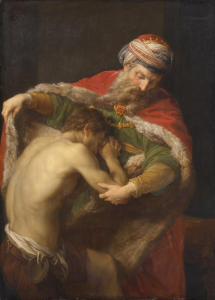
The follies of youth, the balm of a father’s forgiveness, the harshness that may arise among siblings … these are some of the topics that Jesus covers in his Parable of the Prodigal Son in Luke 15:11-32.
Ministers Leslie Boone and Glen Anderson say the story primarily shows the superiority of God’s forgiveness to man’s.
“So many people can relate to the son who was lost, his cry for mercy and wanting to go back home,” said Boone, minister of Andrews Church of Christ. “As I’ve gotten older, I have wondered which is the better lesson, how the father welcomes his son back or how the older brother needs to learn to love his brother.
“We all want grace and mercy, but it can be hard to give it to the people around us.”
Boone said God has always been more loving than people and he always will be.
“The amount of money that the Prodigal Son got from his father was not as much as he had thought it was and he ended up spending it a lot quicker than he had planned with his so-called friends,” he said. “The shame he felt helps us to understand what really matters.
“Then Jesus flips it around to talk about how the father was being lavish with what he gave the younger son when he brought him back. It’s the idea of God being extravagant with his mercy and kindness.”
The Rev. Anderson, pastor of the First United Methodist Church in Crane, said a key element of the story is the prodigal son’s recognition of his folly and his eagerness to be forgiven.
“The older son was angry and jealous with how he had been treated because his brother had wandered away and squandered his fortune and then had been allowed to return while he had stayed faithful and kept working with his father,” Anderson said.
“God’s mercy knows no bounds so long as the sinner is repentant. When we recognize that we have done wrong, we are forgiven automatically because we are part of the family.”



